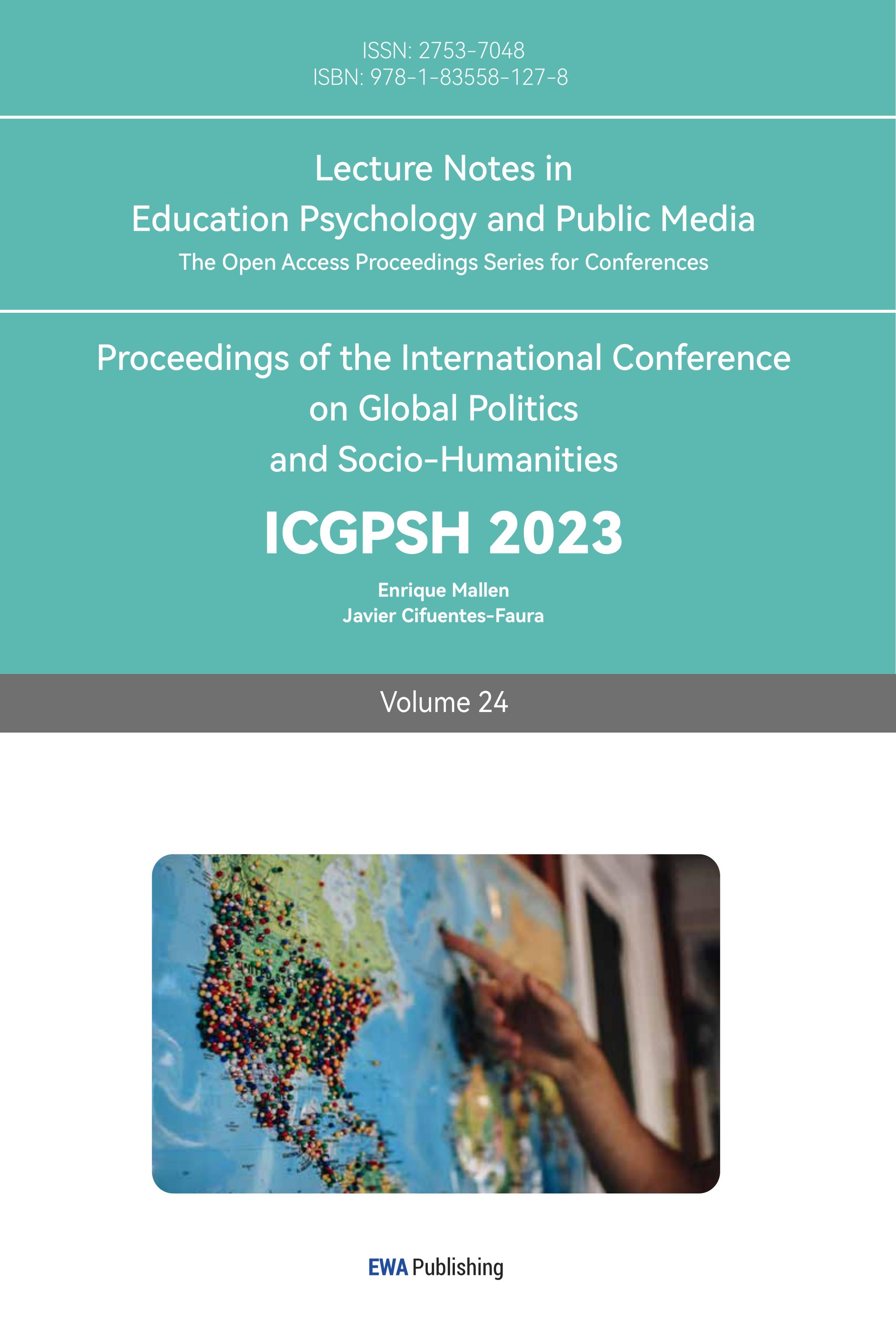References
[1]. Wyplosz, Charles (1997) EMU: Why and How It Might Happen. Journal of Economic Perspectives, 11 (4): 3-21.
[2]. Lane, Philip, R. (2006) The Real Effects of European Monetary Union. Journal of Economic Perspectives, 20 (4): 47-66.
[3]. He Youhua , Y. (2002) A political economic analysis of the European Monetary Union, East China Normal University
[4]. Klein, Michael W. (1998) European Monetary Union. New England Economic Review. Boston, 3-12.
[5]. Eurostat.(2022)Retrievedfrom:https://ec.europa.eu/eurostat/web/main/search//search/estatsearchportlet_WAR_estatsearchportlet_INSTANCE_bHVzuvn1SZ8J?text=Gini+coefficient+on+household+population++experimental+statistics&_estatsearchportlet_WAR_estatsearchportlet_INSTANCE_bHVzuvn1SZ8J_collection=&_estatsearchportlet_WAR_estatsearchportlet_INSTANCE_bHVzuvn1SZ8J_theme=
[6]. Our World In Data. (2021) Annual growth of GDP per capita, 2002 to 2018. Retrieved from: https://ourworldindata.org/grapher/gdp-per-capita- growth?tab=chart&time=2002..2018&country=OWID_EU27~ITA
[7]. Eurostat.(2022)Retrievedfrom:https://ec.europa.eu/eurostat/web/main/search//search/estatsearchportlet_WAR_estatsearchportlet_INSTANCE_bHVzuvn1SZ8J?text=debt&_estatsearchportlet_WAR_estatsearchportlet_INSTANCE_bHVzuvn1SZ8J_collection=&_estatsearchportlet_WAR_estatsearchportlet_INSTANCE_bHVzuvn1SZ8J_theme=
[8]. World Bank.(2020) Net trade in goods and services (BoP, current US$) – Italy. Retrieved from: https://data.worldbank.org/indicator/BN.GSR.GNFS.CD?locations=IT
[9]. Iacopo Mugnai. (2022) The politics of ECB’s economic ideas and its implications for European economic governance: embedding a resilient EMU from the top-down? Comparative European Politics, 10.1057/s41295-022-00289-2.
[10]. Li X. (1997) On the reasons, benefits and costs of establishing the European Monetary Union. Journal of Sun Yat-sen University, Social Sciences Edition, 37(6): 2-8.
Cite this article
Xie,R. (2023). Has Italy Won or Lose in the European Monetary Union. Lecture Notes in Education Psychology and Public Media,24,141-145.
Data availability
The datasets used and/or analyzed during the current study will be available from the authors upon reasonable request.
Disclaimer/Publisher's Note
The statements, opinions and data contained in all publications are solely those of the individual author(s) and contributor(s) and not of EWA Publishing and/or the editor(s). EWA Publishing and/or the editor(s) disclaim responsibility for any injury to people or property resulting from any ideas, methods, instructions or products referred to in the content.
About volume
Volume title: Proceedings of the International Conference on Global Politics and Socio-Humanities
© 2024 by the author(s). Licensee EWA Publishing, Oxford, UK. This article is an open access article distributed under the terms and
conditions of the Creative Commons Attribution (CC BY) license. Authors who
publish this series agree to the following terms:
1. Authors retain copyright and grant the series right of first publication with the work simultaneously licensed under a Creative Commons
Attribution License that allows others to share the work with an acknowledgment of the work's authorship and initial publication in this
series.
2. Authors are able to enter into separate, additional contractual arrangements for the non-exclusive distribution of the series's published
version of the work (e.g., post it to an institutional repository or publish it in a book), with an acknowledgment of its initial
publication in this series.
3. Authors are permitted and encouraged to post their work online (e.g., in institutional repositories or on their website) prior to and
during the submission process, as it can lead to productive exchanges, as well as earlier and greater citation of published work (See
Open access policy for details).
References
[1]. Wyplosz, Charles (1997) EMU: Why and How It Might Happen. Journal of Economic Perspectives, 11 (4): 3-21.
[2]. Lane, Philip, R. (2006) The Real Effects of European Monetary Union. Journal of Economic Perspectives, 20 (4): 47-66.
[3]. He Youhua , Y. (2002) A political economic analysis of the European Monetary Union, East China Normal University
[4]. Klein, Michael W. (1998) European Monetary Union. New England Economic Review. Boston, 3-12.
[5]. Eurostat.(2022)Retrievedfrom:https://ec.europa.eu/eurostat/web/main/search//search/estatsearchportlet_WAR_estatsearchportlet_INSTANCE_bHVzuvn1SZ8J?text=Gini+coefficient+on+household+population++experimental+statistics&_estatsearchportlet_WAR_estatsearchportlet_INSTANCE_bHVzuvn1SZ8J_collection=&_estatsearchportlet_WAR_estatsearchportlet_INSTANCE_bHVzuvn1SZ8J_theme=
[6]. Our World In Data. (2021) Annual growth of GDP per capita, 2002 to 2018. Retrieved from: https://ourworldindata.org/grapher/gdp-per-capita- growth?tab=chart&time=2002..2018&country=OWID_EU27~ITA
[7]. Eurostat.(2022)Retrievedfrom:https://ec.europa.eu/eurostat/web/main/search//search/estatsearchportlet_WAR_estatsearchportlet_INSTANCE_bHVzuvn1SZ8J?text=debt&_estatsearchportlet_WAR_estatsearchportlet_INSTANCE_bHVzuvn1SZ8J_collection=&_estatsearchportlet_WAR_estatsearchportlet_INSTANCE_bHVzuvn1SZ8J_theme=
[8]. World Bank.(2020) Net trade in goods and services (BoP, current US$) – Italy. Retrieved from: https://data.worldbank.org/indicator/BN.GSR.GNFS.CD?locations=IT
[9]. Iacopo Mugnai. (2022) The politics of ECB’s economic ideas and its implications for European economic governance: embedding a resilient EMU from the top-down? Comparative European Politics, 10.1057/s41295-022-00289-2.
[10]. Li X. (1997) On the reasons, benefits and costs of establishing the European Monetary Union. Journal of Sun Yat-sen University, Social Sciences Edition, 37(6): 2-8.









